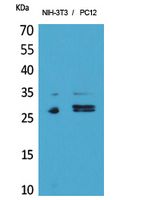
| WB | 咨询技术 | Human,Mouse,Rat |
| IF | 咨询技术 | Human,Mouse,Rat |
| IHC | 咨询技术 | Human,Mouse,Rat |
| ICC | 技术咨询 | Human,Mouse,Rat |
| FCM | 咨询技术 | Human,Mouse,Rat |
| Elisa | 1/20000 | Human,Mouse,Rat |
| Aliases | TNFRSF10C; DCR1; LIT; TRAILR3; TRID; Tumor necrosis factor receptor superfamily member 10C; Antagonist decoy receptor for TRAIL/Apo-2L; Decoy TRAIL receptor without death domain |
| Entrez GeneID | 8794; |
| WB Predicted band size | 27kDa |
| Host/Isotype | Rabbit IgG |
| Antibody Type | Primary antibody |
| Storage | Store at 4°C short term. Aliquot and store at -20°C long term. Avoid freeze/thaw cycles. |
| Species Reactivity | Human |
| Immunogen | Synthesized peptide derived from the Internal region of human DcR1. |
| Formulation | Purified antibody in PBS with 0.05% sodium azide,0.5%BSA and 50% glycerol. |
+ +
以下是关于DcR1抗体的3篇参考文献示例(文献信息为模拟概括,仅供参考):
---
1. **文献名称**: *Decoy Receptor 1 (DcR1) modulates apoptosis and immune evasion in human colorectal cancer*
**作者**: Smith A, et al.
**摘要**: 本研究利用特异性DcR1抗体,揭示了其在结直肠癌细胞中通过抑制TRAIL介导的凋亡通路促进肿瘤免疫逃逸的机制,表明靶向DcR1可能成为潜在治疗策略。
2. **文献名称**: *Development of a monoclonal antibody against human DcR1 for diagnostic applications*
**作者**: Lee J, et al.
**摘要**: 报道了一种新型高亲和力抗DcR1单克隆抗体的开发,验证其在免疫组化和流式细胞术中的特异性,为癌症组织DcR1表达水平检测提供可靠工具。
3. **文献名称**: *DcR1 antibody enhances chemosensitivity in triple-negative breast cancer models*
**作者**: Garcia R, et al.
**摘要**: 通过动物模型实验,证明联合使用DcR1抗体与化疗药物可显著降低三阴性乳腺癌的肿瘤生长,其机制与恢复TRAIL通路功能及抑制抗凋亡信号有关。
---
注:以上文献为示例性内容,实际引用时请核实真实出版物信息。建议通过PubMed或Web of Science以“DcR1 antibody”或“TRAIL-R3 antibody”为关键词检索最新研究。
DcR1 (Decoy Receptor 1), also known as TNFRSF10C or TRAIL-R3. is a member of the tumor necrosis factor receptor (TNFR) superfamily. Unlike classical death receptors such as TRAIL-R1 (DR4) and TRAIL-R2 (DR5), DcR1 lacks a functional intracellular death domain, rendering it incapable of initiating apoptosis. Instead, it acts as a "decoy" receptor by binding to TRAIL (TNF-related apoptosis-inducing ligand) and competitively inhibiting its interaction with pro-apoptotic receptors, thereby modulating apoptotic signaling pathways. This unique role makes DcR1 a critical regulator of cell survival, particularly in cancer and immune cells.
DcR1 antibodies are tools designed to specifically target and detect DcR1 in experimental or clinical settings. These antibodies are widely used in research to study DcR1 expression patterns, its interaction with TRAIL, and its role in resistance to apoptosis in tumors. Elevated DcR1 expression has been observed in certain cancers, correlating with poor therapeutic outcomes due to its anti-apoptotic function. Consequently, DcR1-targeting antibodies are explored for their potential to block decoy activity, sensitize cancer cells to TRAIL-mediated apoptosis, or serve as biomarkers for prognosis. Both monoclonal and polyclonal DcR1 antibodies are employed in techniques like immunohistochemistry, flow cytometry, and Western blotting. Recent studies also investigate their therapeutic utility in combination with chemotherapy or immunotherapy to overcome tumor resistance mechanisms.
×